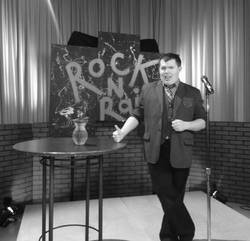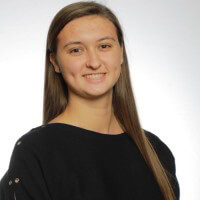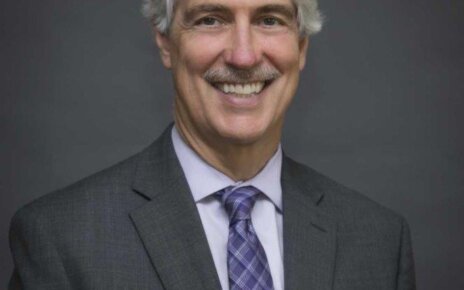Do you believe in magic? Does the sleight of hand intrigue you? Magic throughout time has always had a certain ‘je ne sais quoi’ quality to it, often perplexing and provoking illicit gasps in audiences for centuries. It has evolved into an extraordinary genre that baffles and tricks the senses. It is not your average “abracadabra” form of magic anymore. There is definitely more than pulling a white fuzzy rabbit out of a black hat.
Believe it or not, our University can boast for having a magician walking among us: Ross ‘the Magic Man’ Bernstein, a sophomore music education major minoring in psychology.
Bernstein said that his love for magic began when his uncle, a theater agent, got him a magic set for his seventh birthday. He said, “From then on, my uncle said that if I mastered all the tricks in the set, he’d get me another set. So I mastered all the tricks within a month.” After displaying his command over the tricks he learned, he said his uncle was quite impressed. “He got me a new set of all new magic tricks. I mastered those and he said, ‘You know what? I think now that you’re nine-years-old we can buy you actual magic tricks.’ By the age of nine or 10, I got actual prop magic,” he said.
Soon, Bernstein was able to show his deftness in magic to his middle school classmates. “When I got into middle school, that’s when I started performing magic on stages and stuff for people and showing it. I started out with stage magic; I didn’t get into the cards and stuff until high school. But stage magic is where I started, because I liked the aspect of performing on stage,” he said.
It was during this time that Bernstein branched out into different venues to show his skills, particularly in coffeehouses that had open mics. “When I asked the guy who runs them if I could do magic, he said, ‘Okay, I’ll give you a shot. Just remember these three rules: no cursing, you have a time limit of three minutes, and you can only do three tricks,” he said. Bernstein delivered. He said that the guy was blown away by what he did and was convinced Bernstein was a miracle maker.
For a short time, Bernstein even had a show on Hawk TV. Kate Nawoyski, Station Manager for Hawk TV said, “I thought his magic show was entertaining and was a good addition to Hawk TV. It was something different, unlike any other show we had at the station. He has great stage presence that draws the audience into his magic tricks. And he’s super dedicated to his magic and productions which adds to his overall act.”
Since then, Bernstein has been an avid performer all over the place, not just on campus. He enjoys it when people come to his shows even though they have seen his tricks before. He said, “The funny thing is, when I go I ask who has seen me before, half the hands go up. And I think it’s so weird because you came to see me do the same tricks that I do every time again,” he said.
Bernstein thinks this is because magic is the roadway back to childhood. He said, “In college, we become kids again and there’s that sense of you want to be that child again because we’re adults in class and then we get to be children on the weekend. And magic brings out that in us.”
Kat Perez, member of WMCX, said, “When Ross performs, the word ‘tricks’ doesn’t accurately describe his skill. The word that truly describes what Ross creates is ‘magic.’ Not only is the audience enjoying his talent, but also his obvious joy and enthusiasm while performing. He loves what he does and it shows greatly in his performances.”
Kelly Easton, member of WMCX, said, “My friend and I had him on our radio show, Random Roulette, because our theme for the night was magic so we had him do some tricks for everyone to watch on the webcam. No matter how hard I tried to figure out what he was doing, I couldn’t think of an explanation.”
In total, Bernstein has been practicing magic for about 13 years and performing for nine of them. When asked what his favorite medium to work in is, he found it hard to say. “There are different categories within magic so you can’t really compare them to each other. You can’t compare card magic to stage magic. The best card trick compared to the best stage trick, you just can’t. If I had to pick a favorite card trick, because that’s what I mainly do on campus, it would be the invisible deck.”
The invisible deck is a clever trick, in which the participant does all the work by making believe there is a deck of cards in front of them. The participant picks their favorite card, and then Bernstein gets a real deck of cards and picks the card the participant chose. Bernstein said he views himself as the facilitator. “That’s the definition of card magic right there. You did everything by yourself, I just simply brought out a deck at the end and made what you did as ‘magic’ become real. And that’s what magic is supposed to be. It’s supposed to be hands-off, I let you do the magic, and the magic happens with you, not with me.” This trick has stumped 17 professors here, Bernstein said.
Dr. David Marshall, Chair of the Department of Mathematics, had Bernstein as a first-year student in his seminar class, “Numbers, Clocks, and Secret Codes,” where Bernstein incorporated his magic skills into a final project. Marshall said, “Students were required to choose a topic which was in some way related to the concept of ‘code,’ and design a presentation for the class on that topic. Ross gave a very good presentation to the class on card codes magicians’ use for performing card tricks.”
In high school, Ross started his own company called Outrageous Parties. Not only did he do magic, but he also was a DJ and MC. But his magic supplies were not far away. “Even if I was doing a DJ gig, I would bring my magic stuff with me because you never knew what was going to happen,” he said.
Bernstein said that he enjoys doing magic tricks at birthday parties because the kids are such true believers in the magic itself. “I get some of my best lines from kids. I find that their logic is just the root of where magic comes from. You have to think like a kid in order to truly appreciate magic,” he said.
Bernstein said that he enjoys it when kids heckle. He said it gets them more vocally involved and enhances their overall entertainment of the show that he puts on.
There are about 25 magicians in this area alone. Every month, Bernstein attends an International Brotherhood of Magicians meeting with these fellow local magicians, which he has been attending for five years. “I’m a semiprofessional since I don’t do it fulltime, but when I do perform I get paid. When you’re an amateur, you don’t get paid,” he said. Ross also is currently a magician mentor to two high school students.
After every magic show, there is always those audience members who ask the question all magicians dread to hear. Bernstein said, “I hate when people ask me, ‘How did you do that?’ In response, he says, “Well if I told you, I’d have to saw you in half, put one half of your body in the Hudson and the other half in the Pacific Ocean. And that usually scares them away.”
Magic is more than just the illusions and performing for Bernstein though. “I love psychology; psychology is behind all of my tricks. Psychology behind all magic is very in-depth. If you’re a psychology major, you can probably get behind my whole script that I have for my show and analyze what I’m doing,” he said. The cognitive element of magic has interested Bernstein for a while, since in high school he did a thesis on magic and its history, where it’s going, and what the future of magic looks like.
For all those who still are kids at heart, magic is a mesmerizing type of art form that has the ability to astound and leave viewers in awe. For dates and times when Ross will perform, check out and like his page on Facebook, “Ross the Magic Man.” Bernstein said, “Magic is the belief that a person can do the impossible. People find magic every day. Magic’s not only on stage. When magic is on the stage, it’s a forced example of what you can see every day naturally.”
PHOTO COURTESY of Ross Bernstein




